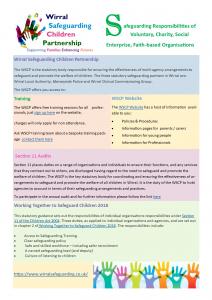Safeguarding Responsibilities for the Voluntary, Charity, Social Enterprise and Private Sector
Wirral Safeguarding Children Partnership
The WSCP is the statutory body responsible for ensuring the effectiveness of multi-agency arrangements to safeguard and promote the welfare of children. The three statutory safeguarding partners in Wirral are: Wirral Local Authority, Merseyside Police and Wirral Clinical Commissioning Group.
The three safeguarding partners are committed to providing a safeguarding system in Wirral where:
- excellent practice is the norm, and can be seen in common across services
- partner agencies hold one another to account effectively, and improvement
- results there is early identification of, and co-owned action on ‘new’ safeguarding issues
- learning is promoted and embedded, and its effects can be proven
- information is shared effectively and translates into knowledge that informs practice
the public are engaged in safeguarding all children and feel confident that children are protected from harm
Working Together to Safeguard Children 2018
This statutory guidance sets out the responsibilities of individual organisations responsibilities under Section 11 of the Children Act 2004. These duties, as applied to individual organisations and agencies, and are set out in chapter 2 of Working Together to Safeguard Children 2018. The responsibilities include:
- Clear safeguarding policy
- Culture of listening to children
- Safe and skilled workforce – including safer recruitment
- A named safeguarding lead (and deputy)
- Access to safeguarding training
Download the flyer to display in your Organisation or Agency
Section 11 / 175 Audit
The WSCP is the key statutory body for coordinating and ensuring the effectiveness of arrangements to safeguard and promote the welfare of all children in Wirral. It is the duty of the WSCP to hold agencies to account in terms of their safeguarding arrangements and practices.
The WSCP uses a variety of ways to test the strength of safeguarding arrangements across agencies in Wirral but one of the key ways is by the use of an annual safeguarding audit called the Section 11 Audit (for agencies). Section 11 was issued under the Children Act (2004) and has been reinforced in Working Together to Safeguard Children 2018. Section 11 places duties on a range of organisations and individuals to ensure their functions, and any services that they contract out to others, are discharged having regard to the need to safeguard and promote the welfare of children, including:
- a clear line of accountability for the commissioning and/or provision of services designed to safeguard and promote the welfare of children
- a senior board level lead with the required knowledge, skills and expertise or sufficiently qualified and experienced to take leadership responsibility for the organisation’s/agency’s safeguarding arrangements
- a culture of listening to children and taking account of their wishes and feelings, both in individual decisions and the development of services
- clear whistleblowing procedures, which reflect the principles in Sir Robert Francis’ Freedom to Speak Up Review and are suitably referenced in staff training and codes of conduct, and a culture that enables issues about safeguarding and promoting the welfare of children to be addressed
- clear escalation policies for staff to follow when their child safeguarding concerns are not being addressed within their organisation or by other agencies
- arrangements which set out clearly the processes for sharing information, with other practitioners and with safeguarding partners
- a designated practitioner (or, for health commissioning and health provider organisations/agencies, designated and named practitioners) for child safeguarding. Their role is to support other practitioners in their organisations and agencies to recognise the needs of children, including protection from possible abuse or neglect. Designated practitioner roles should always be explicitly defined in job descriptions. Practitioners should be given sufficient time, funding, supervision and support to fulfil their child welfare and safeguarding responsibilities effectively
- safe recruitment practices and ongoing safe working practices for individuals whom the organisation or agency permit to work regularly with children, including policies on when to obtain a criminal record check
- appropriate supervision and support for staff, including undertaking safeguarding training
- creating a culture of safety, equality and protection within the services they provide
In addition:
- employers are responsible for ensuring that their staff are competent to carry out their responsibilities for safeguarding and promoting the welfare of children and creating an environment where staff feel able to raise concerns and feel supported in their safeguarding role
- staff should be given a mandatory induction, which includes familiarisation with child protection responsibilities and the procedures to be followed if anyone has any concerns about a child’s safety or welfare
- all practitioners should have regular reviews of their own practice to ensure they have knowledge, skills and expertise that improve over time
To participate in the annual audit and for further information please follow the link here
Voluntary, charity, social enterprise, faith-based organisations and private sectors
- Voluntary, charity, social enterprise (VCSE) and private sector organisations and agencies play an important role in safeguarding children through the services they deliver. Some of these will work with particular communities, with different races and faith communities and delivering in health, adult social care, housing, prisons and probation services. They may as part of their work provide a wide range of activities for children and have an important role in safeguarding children and supporting families and communities.
- Like other organisations and agencies who work with children, they should have appropriate arrangements in place to safeguard and protect children from harm. Many of these organisations and agencies as well as many schools, children’s centres, early years and childcare organisations, will be subject to charity law and regulated either by the Charity Commission or other ‘principal’ regulators. Charity trustees are responsible for ensuring that those benefiting from, or working with, their charity, are not harmed in any way through contact with it. The Charity Commission for England and Wales provides guidance on charity compliance which should be followed.
- Some of these organisations and agencies are large national charities whilst others will have a much smaller local reach. Some will be delivering statutory services and may be run by volunteers, such as library services. This important group of organisations includes youth services not delivered by local authorities or district councils.
- All practitioners working in these organisations and agencies who are working with children and their families are subject to the same safeguarding responsibilities, whether paid as a volunteer.
- Every VCSE, faith-based organisation and private sector organisation or agency should have policies in place to safeguard and protect children from harm. These should be followed and systems should be in place to ensure compliance in this. Individual practitioners, whether paid or volunteer, should be aware of their responsibilities for safeguarding and protecting children from harm, how they should respond to child protection concerns and how to make a referral to local authority children’s social care or the police if necessary.
- Every VCSE, faith based organisation and private sector organisation or agency should have in place the arrangements described in this chapter. They should be aware of how they need to work with the safeguarding partners in a local area. Charities (within the meaning of section 1 Charities Act 2011), religious organisations (regulation 34 and schedule 3 to School Admissions) and any person involved in the provision, supervision or oversight of sport or leisure are included within the relevant agency regulations. This means if the safeguarding partners name them as a relevant partner they must cooperate. Other VCSE, faith-based and private sector organisations not on the list of relevant agencies can also be asked to cooperate as part of the local arrangements and should do so.
How Wirral Safeguarding Children Partnership can Support your Organisation
Wirral Safeguarding Children Partnership is keen to support all voluntary, charity, social enterprise, faith-based organisations and private sectors to provide a safe environment in which children can flourish. You can get further advice by visiting the WSCP website here
We are also on hand to discuss your training requirements and can offer bespoke courses (at an additional cost) to support organisations if required. Email the training team to discuss your requirements.


